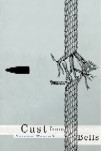
Cast From Bells
Suzanne Hancock
McGill-Queen's University Press
$$16.95
paper
72pp
978-0773537200
Bells symbolize human beings in various ways: they have lips and tongues and bellies, they sing, and they sound when struck. Hancock uses the bells of Europe as metaphors for a troubled relationship, which creates a problem of proportion: war in Europe and a faltering love are not perfectly congruent. The poet effectively conveys reconciliation and renewal, however, by describing the transformation of munitions back into bells at the end of the war. This is a brilliant conceit, adding one stage to the Biblical formula: ploughshares beaten into swords, swords turned back to ploughshares. In place of titles, the poems are headed with rather phallic bullets or shells, and these perhaps anticipate the transformation of destruction into fecundity.
One of the best poems has no bell imagery at all but uses the blind dolphins of the Ganges as a way of talking about the awkward dealings of people with each other: the dolphins rely on sonar in their tentative relations with each other. This poem and several others make it clear that Hancock is not just a poet who hit on a lucky formula through the story of the bells of Europe: she has metaphorical reach of her own. The formal variety of the book and the richness of the language make this a strong collection. She can spread lines in patterns over a page; she can also write a good sonnet. mRb






0 Comments